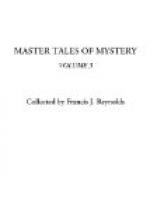Apparently, we saw, as we edged up into the front of the crowd, here was a building whose whole front had literally been torn off and wrecked. The thick plate-glass of the windows was smashed to a mass of greenish splinters on the sidewalk, while the windows of the upper floors and for several houses down the block in either street were likewise broken. Some thick iron bars which had formerly protected the windows were now bent and twisted. A huge hole yawned in the floor inside the doorway, and peering in we could see the desks and chairs a tangled mass of kindling.
“What’s the matter?” I inquired of an officer near me, displaying my reporter’s fire-line badge, more for its moral effect than in the hope of getting any real information in these days of enforced silence toward the press.
“Black Hand bomb,” was the laconic reply.
“Whew!” I whistled. “Anyone hurt?”
“They don’t usually kill anyone, do they?” asked the officer by way of reply to test my acquaintance with such things.
“No,” I admitted. “They destroy more property than lives. But did they get anyone this time? This must have been a thoroughly over-loaded bomb, I should judge by the looks of things.”
“Came pretty close to it. The bank hadn’t any more than opened when, bang! went this gas-pipe-and-dynamite thing. Crowd collected before the smoke had fairly cleared. Man who owns the bank was hurt, but not badly. Now come, beat it down to headquarters if you want to find out any more. You’ll find it printed on the pink slip—the ’squeal book’—by this time. ’Gainst the rules for me to talk,” he added with a good-natured grin, then to the crowd: “G’wan, now. You’re blockin’ traffic. Keep movin’.”
I turned to Craig and Luigi. Their eyes were riveted on the big gilt sign, half broken, and all askew overhead. It read:
CIRO DI CESARE & CO. BANKERS
NEW YORK, GENOA, NAPLES, ROME, PALERMO
“This is the reminder so that Gennaro and his father-in-law will not forget,” I gasped.
“Yes,” added Craig, pulling us away, “and Cesare himself is wounded, too. Perhaps that was for putting up the notice refusing to pay. Perhaps not. It’s a queer case—they usually set the bombs off at night when no one is around. There must be more back of this than merely to scare Gennaro. It looks to me as if they were after Cesare, too, first by poison, then by dynamite.”
We shouldered our way out through the crowd and went on until we came to Mulberry Street, pulsing with life. Down we went past the little shops, dodging the children, and making way for women with huge bundles of sweat-shop clothing accurately balanced on their heads or hugged up under their capacious capes. Here was just one little colony of the hundreds of thousands of Italians—a population larger than the Italian population of Rome—of whose life the rest of New York knew and cared nothing.




